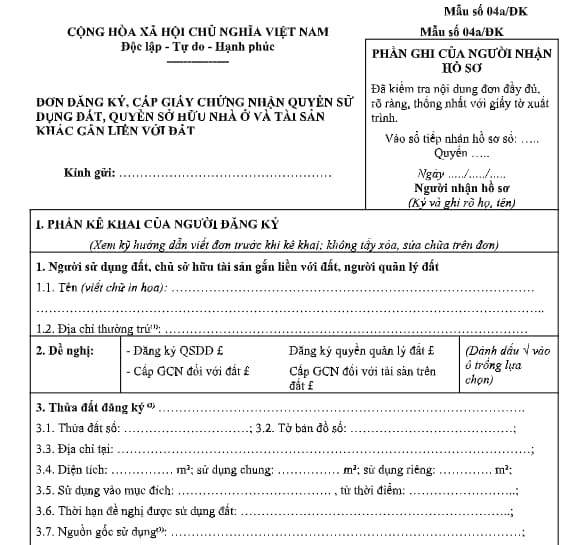After building a house, is it mandatory to register house ownership in Vietnam? Why should we register house ownership?
After building a house, is it mandatory to register house ownership?
Pursuant to Clause 1, Article 95 of the 2013 Land Law of Vietnam affirming the following:
Registration of land, houses and other land-attached assets
1. Land registration is compulsory for land users and people who are allocated land for management. Registration of ownership of houses and other land-attached assets is conducted at the request of the owner.
Thus, the above regulation shows that registration of house ownership after house construction is not mandatory.
House owners are not required to register ownership and will not be penalized.

After building a house, is it mandatory to register house ownership in Vietnam? Why should we register house ownership?
Why should we register house ownership in Vietnam?
As mentioned above, the registration of house ownership is not mandatory. However, people should still register house ownership for the following reasons:
Firstly, adding housing information to the Land Use Right Certificate (Red Book).
- A certificate of land use rights (or a certificate of land use rights, ownership of houses and other land-attached assets, also known as red books) is a legal document for the State to certify the right to use land. Lawful land use rights, ownership of houses and other land-attached assets of persons with land use rights, house ownerships and ownership of other land-attached assets as prescribed in Clause 16, Article 3 of the 2013 Land Law of Vietnam.
- The form of the Certificate of land use rights specified in Article 3 of Circular 23/2014/TT-BTNMT consists of one sheet of 04 pages, printed with a lotus-pink bronze drum pattern (called the blank Certificate) and white background supplement page; Each page measures 190mm x 265mm. In which, information about housing is recorded on Page 2.
Secondly, use the certificate of land use right for transaction, transfer, donation, mortgage
Specifically, Clause 1, Article 118 of the 2014 Law on Housing of Vietnam provides as follows:
Requirements applied to houses entered into transactions
1. Any house regarding transactions in housing sale, lease purchase, gifting, mortgage, or capital contribution shall meet the requirements below:
a) There is the Certificate as prescribed, except for cases prescribed in Clause 2 of this Article;
...
Thus, a house owner who wants to sell, donate, mortgage or contribute capital must have a land use right certificate (red book) which is a legal document certifying house ownership.
Or it can be understood that when housing information is updated in the certificate of land use rights, the owner can legally establish full ownership of the house and land-attached assets.
Thirdly, prove that the house is lawful when the State recovers the land causing damage to the house for compensation.
Clause 1, Article 88 of the 2013 Land Law of Vietnam stipulates the principles of compensation for property damage when the State recovers land as follows:
Principles of compensation for damage to assets and damage incurred due to stopped production and business upon land expropriation by the State
1. If land-attached assets are damaged upon land expropriation by the State, lawful owners of those assets are entitled to compensation.
...
Thus, the third reason for people to register house ownership after building a house is that it is easy to prove that the house is a legal property when the State recovers the land and causes damage to the house.
What are the application and procedures for registration of house ownership in Vietnam?
Regarding the application for registration of house ownership:
According to the provisions of Clause 3, Article 8 of Circular 24/2014/TT-BTNMT (amended and supplemented by Clause 1, Article 7 of Circular 33/2017/TT-BTNMT) on documents submitted when carrying out procedures for registration of rights own the following housing:
- An application form for granting ownership of houses and other land-attached assets, made according to Form No. 04a/DK;
- One of the papers specified in Article 31 of Decree 43/2014/ND-CP;
- A diagram of assets attached to land (unless there is a diagram of property on land in the document on ownership of land-attached assets).
- Proof of fulfillment of financial obligations; papers related to the exemption or reduction of financial obligations on land-attached assets (if any);
- Notarized or authenticated written consent of the land user for the construction of the work in accordance with the provisions of law and a copy of the paper on the land use rights in accordance with the provisions of the law on land in case the owner of the work is not concurrently the land user.
An application for grant of ownership of houses and other land-attached assets, made according to Form No. 04a/DK, has the following form:

Download the application for housing ownership here
Regarding the procedure for registration of house ownership:
Pursuant to Article 70 of Decree 43/2014/ND-CP, the procedures for registration of house ownership are as follows:
Step 1: Submit your application
- Households and individuals submit dossiers at the People's Committees of communes, wards and townships where they have houses and land if they need.
- Or submit at the single-window section as prescribed by the People's Committee of the province or centrally run city for transfer to the branch of the land registration office;
- Submit directly at the district-level land use right registration office if there is no branch of the land registration office.
Step 2: Receive and process
Full application will be received and processed.
Step 3: Return the result
Time to return results does not exceed 15 working days from the date of receipt of valid dossiers; no more than 25 working days for communes in mountainous, island, deep-lying, remote areas or areas with difficult or extremely difficult socio-economic conditions.
LawNet